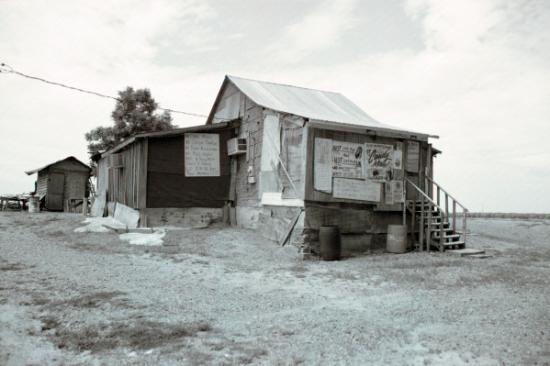
Set Four: The "Lost" Volume; Disc Two; Track Twelve: "Barbecue Bust" performed by Mississippi Jook Band. Recorded in Hattiesburg, Mississippi on July 20, 1936.
The Mississippi Jook Band was a one-off studio band consisting of Roosevelt Graves (guitar and kazoo), Uaroy Graves (tambourine) and Cooney Vaughn (piano). They recorded a handful of sides during this July, 1936 session, including this recording of "Barbecue Bust," recorded only thirteen days after "I'll Be Rested When The Roll Is Called" heard earlier on this disc.
For biographical information on Roosevelt and Uaroy Graves, see the entry for "I'll Be Rested When The Roll Is Called."
No biographical information is available on Cooney Vaughn. In his notes, Dick Spottswood quotes blues historian Gayle Dean Wardlow, who notes that Vaughn is "remembered as a pop performer, not a blues entertainer."
The group's name is a reference to "jook joints" or "juke joints," informal establishments where ordinary people (usually African Americans in the Deep South) congregated to drink, dance, gamble, and otherwise socialize. The term "juke" is believed to derive from the Gullah word "joog," which means "rowdy" or "disorderly." Such establishments first appeared on plantations in the Antebellum South as a place where slaves could socialize and unwind after a long week of work. The practice carried over into the post-Civil War era, often appearing in labor camps, and continued into Prohibition. It has been argued that juke joints represented the first "private space" accorded to blacks in the United States.
Juke joints demanded music, of course. Solo musicians and small groups would provide music for all night dancing (musicians such as Son House and Charlie Patton were veterans of the juke joints). When mechanization and recorded music proved a cheaper way to provide music, the juke joints lent their name to the automatic record playing machines installed in bars and other such establishments, which came to be known as "juke boxes."
"Barbecue Bust" is an almost entirely instrumental piece and is one of the only instrumental performances on the fourth volume of the Anthology. Had it appeared on the original three-volume Anthology, "Barbecue Bust" would have undoubtedly been featured on the first disc of the "Social Music" volume, along with other examples of dance music.
"Barbecue Bust" is an uptempo number, with strong ties to jazz and boogie woogie. The music is occasionally punctuated with cries and exhortations (at a couple of points, Cooney Vaughn is called upon by name). During the last verse, Roosevelt Graves engages in some scat singing. By 1936, scat singing could hardly be called "new," but it serves to solidly place this recording during the jazz age. In addition, Roosevelt Graves plays the kazoo during the first few verses, clearly emulating a jazz cornet. Cooney Vaughn's barrel-house piano ploughs a path through the song, despite being under-miked. Uaroy Graves, while not as prominent in this recording as he had been in "I'll Be Rested When The Roll Is Called", nevertheless lays down a driving rhythm that keeps this recording rolling straight through to the final bar.
"Barbecue Bust" gives us a glimpse of something close to the contemporary black music of the rural south during the late '30s. It is raucous and strident and anything but polite. It is also thoroughly of its time, which further serves to distinguish this volume from the rest of the Anthology.
"Barbecue Bust," like the previous entry, was recorded in Mississippi.
The Shameless Plug Department: You can still become a fan of "Where Dead Voices Gather" on Facebook, however, and follow us on Twitter. Where Dead Voices Gather: Using today's technology to promote yesterday's music!
Remember that I still host "Doin' The Thing," a weekly jazz program on KRML 1410 AM and 94.7 FM in Carmel, California. The show airs from 8 PM to 10PM (Pacific Time) on Sunday nights. You can also listen online by visiting the KRML website at 8 PM Pacific, 11 PM Eastern Time. Please tune in and give me feedback!
Speaking of boogie woogie piano, here's one of the grand masters, Meade Lux Lewis, in a "soundie" likely made during the 1940s...
Download and listen to Mississippi Jook Band - "Barbecue Bust"

No comments:
Post a Comment